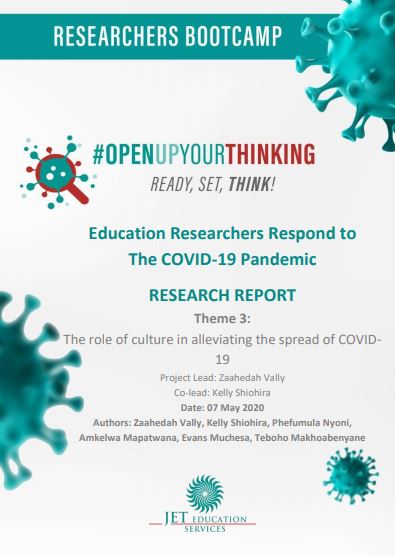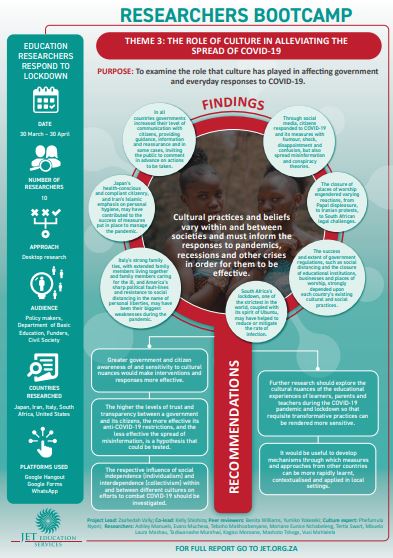Theme 3: The role of culture in alleviating the spread of COVID-19
Lead Researcher: Zaahedah Vally, JET Education Services
Co-lead: Kelly Shiohira, JET Education Services
Peer Reviewer: Yumiko Yokezeki, UNESCO International Institute for Capacity Building in Africa (IICBA), Benita Williams
Culture expert: Phefumula Nyoni
Researchers: Ashley Manuels, Evans Muchesa, Teboho Makhoabenyane, Moriane Eunice Nchabeleng, Tertia Swart, Mbuelo Laura Mashau, Tadiwanashe Murahwi, Kagiso Moroane, Mashoto Tshoga, Vusi Mahlalela
Download the final report and infographic
INTRODUCTION
COVID-19 is a new and unknown virus and as such, many countries are implementing strategies that have shown to produce positive results in contexts that are ahead of the fight, such as China and Italy.
Such strategies may not always fit across cultures neatly, especially when they are not adapted to fit the context of a particular country. Thus, it is of importance that we are cognisant of this when implementing strategies. As with any solution, we should learn from other contexts, but avoid a cut and paste route, and be sensitive towards the cultural nuances that exist across countries.
In the context of this research, culture is defined as the way of life, including the customs, beliefs, and traditions of a particular group of people at a particular time (Cambridge Dictionary). Culture also encompasses religion, food, language, and social habits all learned through socialisation. Given the interconnected world that we live in, culture is a fluid concept that changes as our interactions progress.
As part of this research, we are interested in understanding the following: What role has culture played in affecting responses to the crisis by both governments and the governed? How have cultural practices been adapted in response to the spread of the pandemic? What means and avenues were leveraged to initiate social responses?
The research will look at a set of culturally diverse countries such as Japan, Iran, South Africa, Italy, China, and the USA with particular emphasis on the avenues leveraged to generate social/cultural changes in populations. The different challenges faced by governance structures and societies in response to the pandemic will also be examined, and the means through which these challenges were mitigated.
METHODOLOGY
Given the online nature of this programme, we will confine our sources to desktop research to produce a set of country profiles.
COUNTRY PROFILES
The countries for case selection include: Japan, Iran, South Africa, Italy, the USA. For each country:
Political Systems/engagement
- Health and Medical Systems/engagement
- Labour/work-related Systems/engagement
- Social Practices
- Religious practices
- Anything else that may be important
Coronavirus Response by Country
For each country:
- A timeline of major events related to the outbreak (first case, first case of community transmission, instances of government response (such as declaring a state of emergency, publishing guidelines, ordering production chains to refocus, quarantining areas/individuals, etc).
- A review of the initiatives undertaken by business, government and society to limit the spread of the disease – in particular take note of cultural changes requested or required by the government.
- A review of the mechanisms leveraged by the government to support its initiatives (could be public institutions such as the CDC in America, private sector organisations such as banks or businesses, the creation of new legislation, religious institutions, social media, etc).
- The success of initiatives particularly aimed at changing cultural practices.
Social Responses to the Coronavirus An overview of how societies and individuals in societies engage with the virus and issues around the spread of the disease?
- For example, identification of coronavirus as a “colonizer’s disease” in South Africa, or a “Boomer Remover” in America. Sources can include social media (prominent twitter hashtags/memes/widely shared posts), blog posts, op-eds, political cartoons etc.
- This also includes prominent misinformation and the mechanisms through which it is spread.
- A text analysis will be conducted on these sources to understand the underlying social and cultural meanings.
Country reflections on the Research Questions
- How has culture influenced the measures taken to prevent Covid-19? What challenges and opportunities were created by cultural practices?
- What are effective strategies of governments in both leveraging opportunities and mitigating challenges created by cultural and social aspects of their respective populations?
- How has the onset of Covid-19 and the consequent measures taken to prevent the spread of the virus affected normal cultural practices across different settings?
- What is the role of institutions such as business and industry, third sector organisations and places of worship (churches, mosques, synagogues, temples etc) in creating and supporting culture change? What adaptations and contributions have been expected from these organisations?


